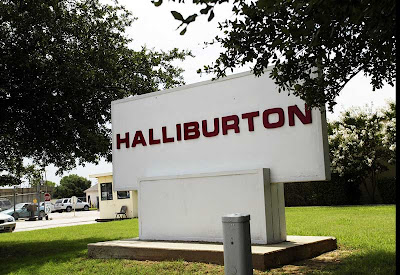Halliburton Company (NYSE: HAL), the world's second largest oil services firm, is scheduled to release first-quarter earnings before the opening bell on Monday, April 18, 2011. Analysts, on average, expect the company to report earnings of 59 cents per share on revenue of $4.92 billion. In the year ago quarter, the company reported earnings of 28 cents per share on revenue of $3.76 billion.
Halliburton Company provides various products and services to the energy industry for the exploration, development, and production of oil and natural gas worldwide. The company operates under two main segments: Completion and Production, and Drilling and Evaluation.
In the preceding fourth-quarter, the Houston, Texas-based company's net income was $605 million or 66 cents per share for the fourth quarter, compared with a profit of $243 million or 27 cents per share in the prior-year quarter. Income from continuing operations for the quarter surged to $625 million or 68 cents per share from $247 million or $0.27 per share in the year-ago quarter. Revenue jumped to $5.16 billion from $3.69 billion in the same quarter last year. Analysts, on average, expected the company to report earnings of 59 cents per share on revenue of $4.92 billion.
The company said that it expects first-quarter earnings to be impacted by seasonal declines due to the effect of year-end product sales and typical weather-related issues that occur in the first quarter of every year. The company forecasts that the impact of these items will be at the high end of the historical range of $0.05 to $0.08 per share due to adverse weather conditions in North America and Australia. Additionally, Halliburton said it has experienced disruptions due to geopolitical issues in certain locations in the Middle East and North Africa that will severely affect first quarter results in the range of $0.03 to $0.04 per share. The company said it may incur additional charges such as asset impairments or allowances as a consequence of the events in the Middle East and North Africa, particularly due to the sanctions imposed on Libya. Halliburton also announced that it expects to increase activity in its Manifa project based on discussions with its customer in Saudi Arabia.
Halliburton enjoys a strong competitive position in the global oilfield services markets, given its array of lucrative development projects and a robust financial profile. The company has significant exposure to most of the fertile oil plays in the U.S, such as the Haynesville, Eagle Ford Shale and Bakken. In the near term, Halliburton is poised to benefit from uptrends in U.S. land drilling activities, where activity is being driven by oil and liquids-rich plays. This will make the reduction in gas activity less meaningful. Halliburton will continue to be a beneficiary of the bullish rig count fundamentals in the U.S., driven by horizontal drilling in the service intensive plays.
The company performed extremely well during the 2008-09 downturn and subsequent recovery. Its 2011 prospects look bright, as its end-stage markets continue to improve. Halliburton has also used the 2008-09 downturn to take out many smaller competitors by setting prices below their cash break-even costs. The aggressive moves during the downturn positioned Halliburton to turn in industry-leading performance in North America as the market recovered in 2010. As the services equipment broke down in the shale plays during the downturn, Halliburton took advantage of its strong financial position by investing in new replacement capacity, and stole huge swaths of market share from its smaller peers.
For more than a decade, Halliburton has been working on integrating its drilling services to fully optimize drilling performance while lowering costs. Halliburton began by placing its drilling engineering applications under one roof, which includes fluids, bits, and directional drilling. Over time, the firm has integrated its services into a single solution, which means that a customer can potentially obtain substantially greater well performance and reduced levels of non-productive time by standardizing on Halliburton's services rather than mixing services from multiple services providers. Halliburton estimates that around 60% of its well completions by the end of 2011 will be using fully-integrated offerings.
However, new environmental regulations for hydraulic fracturing in the shale plays, the intensely competitive nature of the market, and depressed natural gas prices will continue to overhang the stock during the longer-term.
During the quarter in review, the company was awarded a contract by ExxonMobil Iraq Limited (EMIL) to provide drilling services for 15 wells in the West Qurna (Phase I) oil field located in Southern Iraq.
The company's stock currently trades at a forward P/E (fye Dec 31, 2012) of 13.41 and PEG Ratio (5 yr expected) of 0.82. In terms of stock performance, Halliburton shares have gained nearly 53% over the past year.
Full Disclosure: None.
